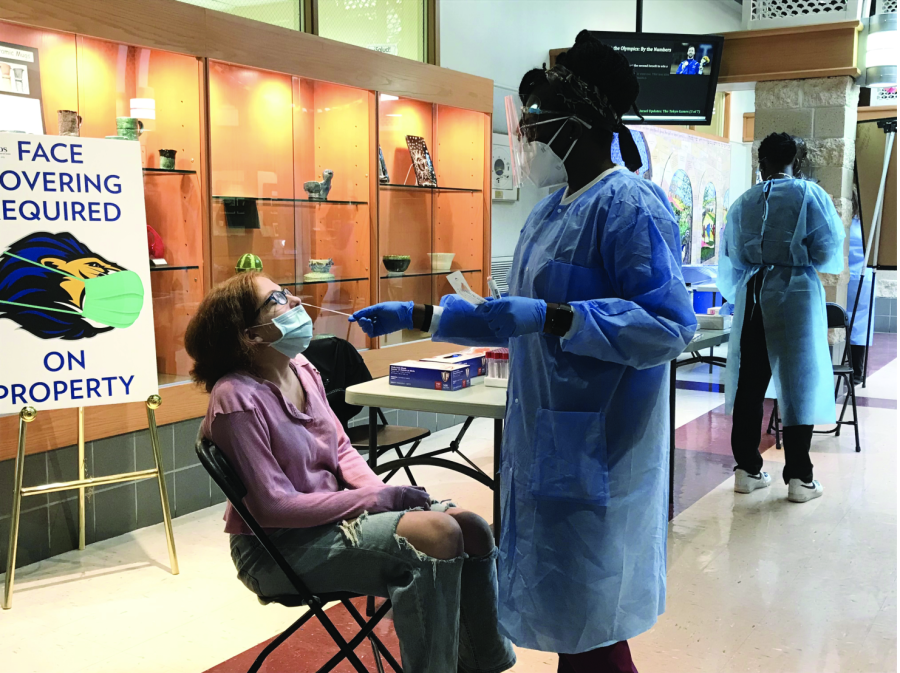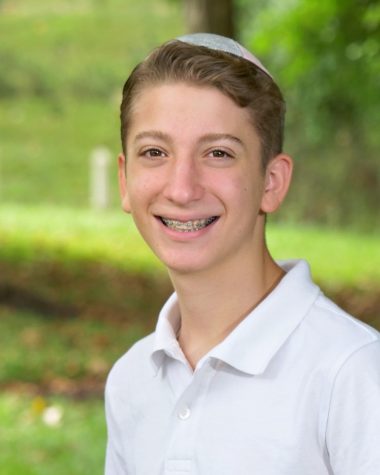Testing, testing, 1, 2, 3
COVID-19 testing has been occurring weekly for over a year
Sophomore Arielle Fellner gets her weekly COVID-19 test by Registered Nurse and COVID-19 Tester Ela Kahe.
December 16, 2021
Every Monday at 12:50 p.m., high school students, teachers and faculty hurry to the cardo to get tested for COVID-19. As they approach the front of the line, they are given a sticker before walking to an empty chair. A feeling of mild dread comes over them as the testers stick a cotton swab into their nostrils. The next day, a notification pops up on their phones disclosing the results.
As the 2021-2022 school year began, CESJDS made the decision to continue weekly COVID-19 testing. Its purpose is to minimize the spread of the virus in order to create a safe learning environment for students and other members of the JDS community to return to.
Senior Ben Guggenheim, like all students and faculty, goes to weekly testing in order to enter the JDS campus. He has learned to schedule his testing time around his lunch break so that he has time to eat and socialize. This contributes to his optimistic attitude the testing requirement.
“I’m generally being pretty positive. They’re not super intrusive, and it’s nice to have the assurance every week that I’m COVID negative,” Guggenheim said.
Currently, there are approximately 853 COVID-19 cases in the state of Maryland per week. Though this number is lower than Maryland’s high of 3,230 cases in January, some front line health care workers view COVID-19 as an urgent issue that needs to be approached more seriously.
Registered Nurse and COVID-19 Tester Ela Kahe is one of the many COVID-19 testers from Capital Diagnostics who administer the testing at JDS. She is a recent graduate from nursing school and has been on the front lines of COVID-19 testing since February 2020. Kahe said she tests approximately 183 members of the JDS community weekly with her colleagues, giving her further insight into the process of COVID-19 testing.
According to the CDC, vaccines are not 100% effective and inoculated people can still get infected. Despite this, Kahe is a strong advocate for vaccination and urges everyone to get vaccinated. She also believes that in the future, weekly testing may not be necessary.
“If vaccination rates go up, then weekly testing could probably go down, probably be like bi-weekly or something, or for specific events and stuff like that,” Kahe said.
Though there is hope for the school to revert to how it was before COVID-19, the virus is constantly changing and instills feelings of uncertainty and fear.
The JDS health department has been overwhelmed by the workload caused by COVID-19 as the testing requires planning, scheduling, coordinating and funding, which is a burden.
“I feel like I have so much responsibility to keep everyone healthy and for them not to bring COVID home,” Upper School Nurse Heather Greenblum said.
So far, there have been 21 cases of COVID-19 throughout the different divisions of JDS since starting weekly testing, but overall it has been a safe environment because of the many precautions. Students who test positive for COVID-19 are strictly quarantined and unable to attend school until they have received a negative test. Capital Diagnostics has played a significant role in the process of getting students back into school and JDS has a stable and cordial connection with them.
“Capitol Diagnostics is run by a doctor who’s really wonderful, and we [JDS health department] have a personal relationship with her. We even have her cell phone number,” Greenblum said.
JDS is currently scheduled to continue the COVID-19 testing for the foreseeable future, with hopes to eventually take a step back from all the precautions. As the JDS community continues to receive negative COVID-19 results, we inch one step closer to achieving a sense of normalcy.
“I think, if you want to be able to see your friends and go to school, it’s better to keep you, but also everyone else, safe,” Kahe said.









